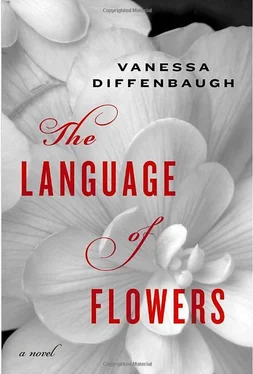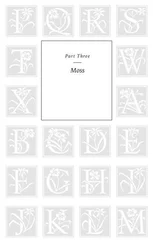Perla reached out, tested the point of the blade with her soft finger, then stepped closer to me and took the knife by its handle.
“Where?” she asked quietly. I pointed to a place just above the brown trunk where a long green arm began. Perla rested the blade against the cactus and closed her eyes before leaning forward with the weight of her whole body. The skin was tough, but once she broke through the outer layer, the knife slipped through easily and the branch fell to the ground. I pointed to the fruit, and Perla cut off each one. They lay on the ground, bleeding red juice.
“Wait here,” I commanded, running through the garden to where I had discarded the dirty gauze.
When I returned, Perla was right where I’d left her. I held the fruit with the gauze, picking up the knife and carefully removing the spines from each prickly pear as if I was skinning a dead animal. I held the ripe, edible fruit out for Perla.
“Here,” I said. She looked at me with confusion.
“I thought you wanted these?” she asked. “For Elizabeth?”
“So take them to her, if you want,” I said. “This is the part I need.” I wrapped the strips of spiny skin in the gauze.
“Now go home,” I said.
Perla cupped the fruit in her hands and walked away slowly, sighing, as if she expected something more from me for her act of loyalty.
I had nothing to give her.
Natalya was Renata’syoungest sister. There were six siblings, all girls. Renata was second in the birth order, Natalya last. It took me all week to gather this information, and for this I was grateful. Most days Natalya slept until late afternoon, and when she was awake she was quiet. She told me once she didn’t like to waste her voice, and the fact that she considered conversation with me a waste did not offend me at all.
Natalya was the vocalist for a punk band that, as she put it, had “made it” only within a twenty-block radius of the apartment. The band had a spirited following in the Mission and a few scattered fans around Dolores Park, and were unknown in every other neighborhood and every other city. They practiced downstairs. The rest of the block comprised offices, some leased and some empty, but all closed after five. Natalya provided me with a box of earplugs and a pile of pillows. Between the two I could reduce the music to only the vibration of the sound on the fur carpet, making it feel even more alive. Most nights her band didn’t start practicing until after midnight, so I had only a few hours of attempted oblivion before I rose.
I didn’t work until the following Saturday, but every morning that week I found myself wandering the streets around the flower market, watching wholesalers back overflowing trucks into the crowded parking lot. I wasn’t looking for the mysterious flower vendor; at least, I told myself I wasn’t. When I did see him, I slipped down an alley and ran until I was out of breath.
By Saturday I had settled on a response. Snapdragon. Presumption . I got to the flower market at four a.m., an hour before Renata, with a five-dollar bill and a new mustard-colored knit hat pulled low over my brow.
The flower vendor was bent over, unloading bushels of lilies, roses, and ranunculus into white plastic tubs. He didn’t see me approach. I took advantage of the time to return the unabashed stare he had released on my body the first day we met, scanning from the back of his neck down to his muddy work boots. He wore the same black hooded sweatshirt he had the first day we met, dirtier this time, with white-speckled work pants. They were the kind with the loop to hold a hammer, but the loop was empty. When he stood up I was standing directly in front of him, my arms overflowing with snapdragons. I had spent five dollars on the flowers, and at wholesale prices that bought me six bunches, mixed bouquets of purple and pink and yellow. I held the flowers high so that the tip of my hat ended where the snapdragons began, hiding my face completely.
I felt his hands close around the bottoms of the stems; his fingers, where they touched my own, were the temperature of the early-morning November sky. Fleetingly, I had the desire to warm them: not with my own hands, which weren’t any warmer, but with my hat or socks, something I could leave behind. He withdrew the flowers, and I stood exposed in front of him, heat rising in pink patches to my face. Turning quickly, I walked away.
Renata was waiting for me at the door, flustered and frantic. She had another big wedding, and the bride was straight out of a Hollywood blockbuster, demanding and irrational. She’d provided Renata with a pages-long list of flowers she liked and disliked, specifying color with paint swatches and size in centimeters. Renata tore the list in two and handed half to me with an envelope of cash.
“Don’t pay full price!” she called after me as I hurried away. “Tell them it’s for me!”* * *
The next morning, Renata sent me to the flower market alone. We had arranged flowers and tied nosegays until five for a six-o’clock wedding, and the stress had launched her into bed rest. Her shop was to be open every Sunday from now on; she’d created a new sign and told all her regulars I would be there. She gave me cash, her wholesale card, and a key. Taping her home phone number to the cash register, she told me not to bother her for any reason.
When I arrived at the flower market, the sky was still dark, and I almost didn’t see him standing to the right of the entrance. He was still, and flowerless, his head bent to the ground but his eyes up, waiting. I walked to the door with a purposeful step, eyes on the metal handle. The market would be busy and loud, but outside it was nearly silent. As I passed he raised a hand, holding up a rolled paper tied with a yellow ribbon. I took the scroll like a runner taking a baton, never breaking stride, and opened the door. The noise greeted me like the roar of a crowd. When I peeked back over my shoulder, he was gone.
Inside, his booth was empty. I crouched inside the white wood, untied the ribbon, and unwrapped the scroll. The paper was visibly old, yellowed and flaking at the corners. It resisted straightening. I held the two bottom corners down with my big toes, the top corners with my thumbs.
The paper held a drawing in faded graphite, not of a flower but of the trunk of a tree, its bark textured and peeling. I ran my fingertip along the bark; although the paper was flat, the drawing was so realistic I could almost feel the rough knobs. In the bottom right-hand corner were the words White Poplar in a curving script.
White poplar. It was not a plant I knew by heart. Taking off my backpack, I withdrew my flower dictionary. I scanned the W’s first, then the P’s, but neither white poplar nor poplar, white was listed. If there was a meaning, I wouldn’t be able to glean it from my dictionary. I rerolled and tied the scroll with the ribbon, but stopped midway through the bow.
On the underside of the ribbon, in a scratchy hand I recognized from flower prices on a chalkboard, were the words Monday, 5 p.m., 16th and Mission. Donuts for dinner . The black ink had spread into the silk so that the words were almost unreadable, but the time and place were clear.
I bought flowers that morning without thinking, without bargaining, and when I opened the shop an hour later, I was surprised by the things I carried.
The morning was slow, and I was grateful. I sat on a tall stool behind the register and flipped through a heavy phone book. The number listed for the San Francisco Public Library had a long recorded message. I listened to it twice, jotting down hours and locations on the back of my hand. Main Library closed at five p.m. on Sundays, as did Bloom. I would have to wait until Monday. Then, based on the meaning I uncovered, I would decide whether or not to meet for donuts.
Читать дальше












